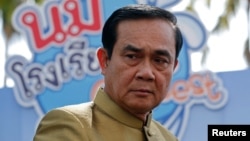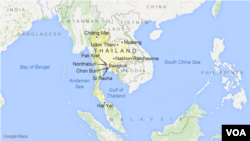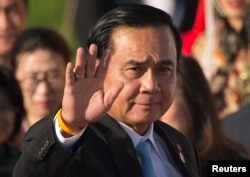Police in Thailand's capital threatened Wednesday to arrest human rights researchers with Amnesty International over an event tied to a new report detailing allegations of “torture and other ill treatment” by the military and police.
Minar Pimple, Amnesty International’s Senior Director of Global Operations, said in a statement authorities “warned that if representatives of Amnesty International spoke at the event, they could be subject to arrest and prosecution under Thailand’s labor laws.”
A spokesman for the group went forward with an impromptu news briefing nearby anyway, detailing a report that alleges 74 cases of Thai soldiers and police using beatings, suffocation by plastic bags, water boarding and forms of humiliation. The group says torture remains "shockingly common" despite pledges by the ruling military government to end abusive practices.
Since seizing power in a bloodless coup in 2014, Thailand's military-backed government has come under international criticism for severe restrictions on freedom of expression, political gatherings and delays in returning to democratic rule. The government argues military rule has been necessary to ensure stability.
Thai military worried
Despite the heavy-handed tactics, the public appears to continue to back the military's leadership role. Last month, voters in Thailand approved a new constitution that expands military powers, with 61 percent of voters supporting the charter.
Political scientists say upcoming memorials to bloody military crackdowns against students in October 1973 and 1976, however, have the military leadership on edge.
Steps to allow political discussion stalled after a recent clash at Thammasat University between students from opposite sides of Thailand’s political divide during a public forum on national political reconciliation.
Panitan Wattanayagorn, an advisor to the defense minister, said judging from the clash, managing the "political space" for people to mark the memorials will be a challenge for the military government.
"Managing the political space in the next few weeks – if there is a riot, if there is a demonstration – big – in front of the national government agencies, something like that, embassies for example – what to do? How to negotiate with them? Ten thousand – 20,000 people – we have experienced,” he said.
'Semi-democracy'
Academics see Thailand as having entered a period of ‘semi-democracy,’ as the military presses ahead with reforms ranging from education to police and justice to anti-corruption. In the recent poll, voters backed the military’s extended influence in the selection of the next prime minister.
That means it is more likely that Thailand’s incumbent junta leader, Prayut Chan-ocha, is on track to remain in the post of prime minister after the next elections, slated as early as 2017.
Former constitution drafter and professor of politics at Chulalongkorn University, Suchit Bunbongkarn, sees few challenges to Prayut keeping his post.
Polls by the National Institute of Development Administration (NIDA) also favored Prayut to return to power as prime minister.
“Who will be the next prime minister? I would say, but don’t believe me, the next prime minister is likely to be General Prayut Chan-ocha. But he will not run in the election – nor will he set up a political party,” Suchit said at a forum on Thailand’s political outlook.
The professor said the government needs to convince "most at home and abroad of the need for this kind of democracy, at least for the time being" to move the country forward.
Stagnating political process
Pandit Chanrochanakit, a lecturer in government at Chulalongkorn University, said the government's tight rein on debate has stifled the country's political culture.
"It's very hard to imagine the future scenario of Thai politics. But I would characterize the future situation of the 'post-Prayut government as semi-democratic, with no civil society," Pandit said.
Despite the likelihood of a diminished civil political discourse, professor Suchit said that there is more politically going on “behind the scenes” in negotiations to “preposition political groups in order to be aligned with the military leaders.”
Government adviser Panitan Wattanayagorn agreed. “They are now looking for opportunities to switch parties already. They are negotiating already with their bosses to run in the next election,” he said.
Politicians have been sidelined since the May 2014 coup. The moves towards the next elections changes that. "[For the politicians] it’s a must for them – it’s a survival issue for them. They are going to be grabbing that space and campaign beginning next month [October]," he said.
Panitan, an adviser to the defense minister, says the military is still hoping to ease its tight grip over public debate.
The military recently announced an end to military trials for most civilian crimes. About 1,800 people have faced military courts over breaches of the interim charter imposed after the coup. The government has consistently prevented activists from staging protests or criticism of official policy.






